Abstract
This entry treats Roger Ascham (1514/15, Kirkby Wiske–1568, London) as a philosopher of literature, a modern phrase, to be sure, but a broad one meant to cover its large and mobile subject, whose literary philosophy lay conceptualized, as typical from the Middle Ages to the Italian Renaissance, within all intellectual pursuits, within, as it were, philosophy. Poetic, of course, was the invention of Aristotle, given a new lease on life with the recovery of Greek. The analysis centers on the section “*Imitatio” in Ascham’s posthumous The Scholemaster (1570). Chronology belies the ages-old habit of classing Ascham among early Tudor humanists. And if Ascham clearly has more affinities with such humanists as the great Henri Estienne (II) in France and Fulvio Orsini in Italy than with Sir Thomas Elyot, he was a fortunate Hellenist to have been formed, by his own proud testimony, at Saint John’s College, Cambridge. To say humanist or humanism, could Ascham have pronounced those words, is to express Ascham’s implacable desire to build and improve upon in theory and practice a Continental and English tradition of classical learning and to return to the Greek and Latin fontes et origines for English poetry and poetics, the whole thrust and direction of these efforts, however, being in motion. The eye Ascham casts upon poetry and poetics, ancient and modern, is critical, taking as little as possible for granted, looking instead to bring back the intention, meaning, feeling, and effect of the author and work, word by word, place by place.
References
Primary
Ascham, Roger, The Scholemaster, London, 1570.
Secondary
Ascham, Roger, Toxophilus, London 1545.
Further Reading
Primary
Camden, William. 1691. Gulielmi Camdeni Annales ab anno 1603 ad annum 1623, appended with separate pagination to Epistolae, 97–99, ed. Thomas Smith. London.
Dryden, John. 1685. Preface, Sylvae. London. Ibid., 1697, Virgil’s “Aeneis.” London. Horman, William and Whittinton, Robert, 1520. Vulgaria. London.
Ursini, Fulvio. 1567. Virgilius collatione scriptorum graecorum illustratus. Antwerp. Strype, John, 1705. The life of Sir John Cheke. London.
Wise, Thomas. 1625. Animadversions upon Lilles grammar, or Lilly scanned. London.
Secondary
Croll, Morris. 1966. Style, rhetoric, and rhythm, ed. J. Max Patrick, et al. Princeton: Princeton University Press.
Eden, Kathy H. 1997. Hermeneutics and the rhetorical tradition: Chapters in the ancient legacy and its humanist reception. New Haven: Yale University Press.
Elyot, Sir Thomas. 1992. A critical edition of Sir Thomas Elyot’s “The Boke named the Governour,” ed. Donald W. Rude. New York: Garland.
Gadoffre, Gilbert. 1997. La Révolution culturelle dans la France des humanistes. Geneva: Droz.
Grafton, Anthony. 1991. On the scholarship of Politian and its context. In Defenders of the text: The traditions of scholarship in an age of science, 1450–1800, ed. Grafton, 47–76. Cambridge: Harvard University Press.
Herrick, Marvin T. 1946. The fusion of Horatian and Aristotelian literary criticism, 1531–1555. Urbana: The University of Illinois Press.
Jonson, Ben. 1925–1952. Timbers, or discoveries. In The works of Ben Jonson, 11 vols., ed. C. H. Herford et al. Oxford: Clarendon Press.
Kaster, Robert. 1988. Guardians of language: The grammarian and society in late antiquity. Berkeley: University of California Press.
Leader, Damian Riehl. 1988. A history of the University of Cambridge, volume one, the university to 1546. Cambridge: Cambridge University Press.
Markey, Timothy James. 1996. The “worke of imitation:” Virgil’s “Eclogues” in England from Ascham to Milton, dissertation, Harvard University. http://id.lib.harvard.edu/aleph/007441106/catalog.
Patterson, Annabel. 1970. Hermogenes and the renaissance: Seven ideas of style. Princeton: Princeton University Press.
Pincombe, Mike. 2001. Elizabethan humanism: Literature and learning in the later sixteenth century. London: Longman.
Rex, Richard. 1991, The theology of John Fisher. Cambridge: Cambridge University Press. Ibid., 1999. The role of the English humanists in the reformation up through 1559, 19–40. In The education of a Christian Society: Humanism and reformation in Britain and the Netherlands,” ed. N. Scott Amos, et al. Aldershot: Ashgate, 1999.
Reynolds, L.D. (ed.). 1983. Texts and transmissions: A survey of the Latin classics. Oxford: Clarendon Press.
Ryan, Laurence V. 1963. Roger Ascham: A life. Palo Alto: Stanford University Press.
Shuger, Deborah K. 1988. Sacred rhetoric: The Christian grand style in the English renaissance. Princeton: Princeton University Press.
Sidney, Sir Philip. 1973. A defence of poetry. In Miscellaneous Prose of Sir Philip Sidney, ed. Katherine Duncan-Jones and Jan van Dorsten. Oxford: Oxford University Press.
Smith, John Hazel. (ed. and trans.). 1964. A humanist’s ‘trew imitation’: Thomas Watson’s “Absalom.” Urbana: University of Illinois Press.
Sowerby, Tracey A. 2010. Renaissance and reform in Tudor England: The careers of sir Richard Morison. Oxford: Oxford University Press.
Spingarn, J. E., 1908–1909. Criticial essays of the seventeenth century, 3 vols. Oxford: Clarendon P. Ibid., A history of literary criticism in the renaissance. New York: 1899.
Spitz, Lewis. (ed. and trans.). 1993. Johann Sturm on education: The reformation and humanist learning. Saint Louis: Concordia Publishing.
Todd, Margot. 1987. Christian humanism and the puritan social order. New York: Cambridge University Press.
Vickers, Sir Brian. (ed.). 1999. English renaissance literary criticism. Oxford: Clarendon Press.
Weinberg, Bernard, 1961. A history of literary criticism in the Italian renaissance, 2 vols. The University of Chicago Press.
Author information
Authors and Affiliations
Corresponding author
Editor information
Editors and Affiliations
Section Editor information
Rights and permissions
Copyright information
© 2019 Springer Nature Switzerland AG
About this entry
Cite this entry
Markey, T. (2019). Ascham, Roger. In: Sgarbi, M. (eds) Encyclopedia of Renaissance Philosophy. Springer, Cham. https://doi.org/10.1007/978-3-319-02848-4_456-2
Download citation
DOI: https://doi.org/10.1007/978-3-319-02848-4_456-2
Received:
Accepted:
Published:
Publisher Name: Springer, Cham
Print ISBN: 978-3-319-02848-4
Online ISBN: 978-3-319-02848-4
eBook Packages: Springer Reference Religion and PhilosophyReference Module Humanities and Social SciencesReference Module Humanities
Publish with us
Chapter history
-
Latest
Ascham, Roger- Published:
- 01 April 2020
DOI: https://doi.org/10.1007/978-3-319-02848-4_456-2
-
Original
Ascham, Roger- Published:
- 08 March 2019
DOI: https://doi.org/10.1007/978-3-319-02848-4_456-1

